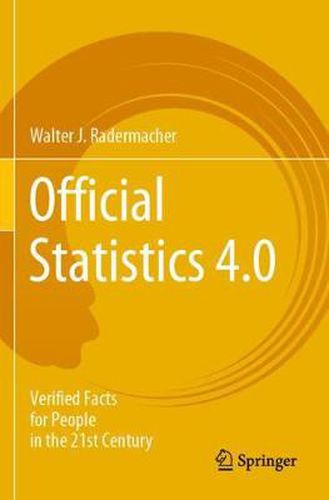Readings Newsletter
Become a Readings Member to make your shopping experience even easier.
Sign in or sign up for free!
You’re not far away from qualifying for FREE standard shipping within Australia
You’ve qualified for FREE standard shipping within Australia
The cart is loading…






This title is printed to order. This book may have been self-published. If so, we cannot guarantee the quality of the content. In the main most books will have gone through the editing process however some may not. We therefore suggest that you be aware of this before ordering this book. If in doubt check either the author or publisher’s details as we are unable to accept any returns unless they are faulty. Please contact us if you have any questions.
This book explores official statistics and their social function in modern societies. Digitisation and globalisation are creating completely new opportunities and risks, a context in which facts (can) play an enormously important part if they are produced with a quality that makes them credible and purpose-specific. In order for this to actually happen, official statistics must continue to actively pursue the modernisation of their working methods.
This book is not about the technical and methodological challenges associated with digitisation and globalisation; rather, it focuses on statistical sociology, which scientifically deals with the peculiarities and pitfalls of governing-by-numbers, and assigns statistics a suitable position in the future informational ecosystem. Further, the book provides a comprehensive overview of modern issues in official statistics, embodied in a historical and conceptual framework that endows it with different and innovative perspectives. Central to this work is the quality of statistical information provided by official statistics. The implementation of the UN Sustainable Development Goals in the form of indicators is another driving force in the search for answers, and is addressed here.
This book will be of interest to a broad readership. The topics of sociology, epistemology, statistical history and the management of production processes, which are important for official statistics and their role in social decision-making processes, are generally not dealt with in statistics books. The book is primary intended for official statisticians, but researchers and advanced students in statistics, economics, sociology and the political sciences will find the book equally stimulating. Last but not least, it offers a valuable source of reflection for policymakers and stakeholders.
$9.00 standard shipping within Australia
FREE standard shipping within Australia for orders over $100.00
Express & International shipping calculated at checkout
This title is printed to order. This book may have been self-published. If so, we cannot guarantee the quality of the content. In the main most books will have gone through the editing process however some may not. We therefore suggest that you be aware of this before ordering this book. If in doubt check either the author or publisher’s details as we are unable to accept any returns unless they are faulty. Please contact us if you have any questions.
This book explores official statistics and their social function in modern societies. Digitisation and globalisation are creating completely new opportunities and risks, a context in which facts (can) play an enormously important part if they are produced with a quality that makes them credible and purpose-specific. In order for this to actually happen, official statistics must continue to actively pursue the modernisation of their working methods.
This book is not about the technical and methodological challenges associated with digitisation and globalisation; rather, it focuses on statistical sociology, which scientifically deals with the peculiarities and pitfalls of governing-by-numbers, and assigns statistics a suitable position in the future informational ecosystem. Further, the book provides a comprehensive overview of modern issues in official statistics, embodied in a historical and conceptual framework that endows it with different and innovative perspectives. Central to this work is the quality of statistical information provided by official statistics. The implementation of the UN Sustainable Development Goals in the form of indicators is another driving force in the search for answers, and is addressed here.
This book will be of interest to a broad readership. The topics of sociology, epistemology, statistical history and the management of production processes, which are important for official statistics and their role in social decision-making processes, are generally not dealt with in statistics books. The book is primary intended for official statisticians, but researchers and advanced students in statistics, economics, sociology and the political sciences will find the book equally stimulating. Last but not least, it offers a valuable source of reflection for policymakers and stakeholders.